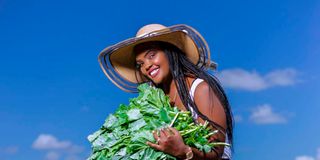She is a real ‘farmer on fire’, lush nails and all

What you need to know:
- I was born and bred in the village, in Nyandarua County. Since farming is all we did back then, I naturally leaned towards it.
- I left the village in 2010 to pursue my first degree at the University of Nairobi,and shortly after I graduated, I found a job.
- I then embarked on my Master’s degree in business administration at USIU in 2018. Life was good but then the worst happened.
Wangari Kuria, aka “Farmer on Fire,” is a mushroom farmer based in Kitengela. She holds a Master’s degree in Business Administration from the United States International University (USIU). She is an agri-fluencer (Agriculture Influencer) and an advocate for urban farming.
What does your career entail?
Apart from farming, I offer agronomic support to farmers who want to get into the venture. So, that makes me a consultant. I’m also a published author, content creator, researcher and moderator.
What does your typical day look like?
I wake up at 11pm (yes, at night), dress warmly and go to my mushroom farm next door. I start harvesting the ready mushrooms with my workers. We harvest and pack the mushrooms as we listen to music for hours. Then we cut, brush and weigh them into 250 grammes packs, and wrap them in cling film. After that, we put them in boxes and into the car. I then head out to Parklands market a few minutes to 3am.
Usually, when I arrive at Parklands, I sell to wholesale buyers who makes offers depending on demand and supply. I always reserve a few punnets for my direct clients who order via social media, then I drop them in town for delivery to the various destinations.
Why farming? When did the idea come about?
I was born and bred in the village, in Nyandarua County. Since farming is all we did back then, I naturally leaned towards it. I left the village in 2010 to pursue my first degree at the University of Nairobi,and shortly after I graduated, I found a job. I then embarked on my Master’s degree in business administration at USIU in 2018. Life was good but then the worst happened. I got retrenched in the real estate company I worked for, and I was left with an unpaid bank loan.
I had to move from Kiambu Road to Kitengela, to a piece of land we had purchased with my family for a rainy day. With only one source of income, we were forced to adjust fast. Depressed and identity-less, I stayed home all day, sad and alone in the middle of nowhere. It is at this point that I started a garden at home.
I later requested my neighbors to lend me their idle spaces to farm, which they agreed. I expanded and started farming vegetables in the arid Kajiado area. I piped the water from my neighbor’s borehole and channeled it to the farm a small fee.
Shortly after I started farming, I was invited for a training programe in mushroom farming held in Limuru. That became a turning point in my life. I went back home sure of what I wanted to do. Although it has been a tough journey, I have learnt a lot about the business. I am now partner founder of the Mushroom Growers Association of Kenya, and our goal is to leverage on each other’s knowledge and skills to collectively find a market for our produce.
I love the titles “Mushroom Queen” and “Farmer on Fire. ” Additionally, I host an online space with hundreds of women who farm to discuss, learn, vent and pursue various opportunities in agriculture. Farmer on Fire show is available on YouTube, LinkedIn, and Facebook.
How was the idea to focus on farming received by those around you?
The reactions were mixed. My goal wasn’t to shame the growers, I was determined to restore dignity in farming. I wanted to use social media to advocate for culture change so that farmers could get higher yields. My friends and family members kept asking, Are you sure you can actually farm with your manicured nails?
For sure I was not the typical farmer. I came across as educated, smart, privileged and proud. But then I kept doing it, year in year out. They began coming for farm visits to find out if I was truly a farmer or a socialite. Now everyone around me has accepted my choice. In fact, most of them make mushroom orders every week.
Who are your mentors? Who do you look up to?
Since I was a little girl, my father called me Wangari Mathai because of my joy, enthusiasm and drive when it comes to going after my dreams. And yes, locally, I have mentors who have shaped my mind to see “farmer on fire” as a global brand.
How do you maximise your income?
Apart from selling my books and fresh mushrooms, I take influencer gigs, and also offer training in agriculture.
What is the most interesting bit of what you do?
I have limited land, yet I have commercialised it. Farmers in urban areas are blessed with a ready market. I love sharing the knowledge I have with farmers, especially because doing so bridges the huge information gap. This is something I really enjoy and can do it in my sleep, even without pay. It is mainly about passion.
What are the key challenges have you encountered so far?
Maintaining the mushroom houses is not easy. This is because mushroom farming is more of a technique. Tampering with little factors such as temperature and humidity can lead to crop failure, which is stressful.
What are your future dreams?
To finish my PhD, and have 1,000 urban mushroom farms by the end of this year. I also want to get into research to figure a practical and sustainable way out of the climate change menace.




